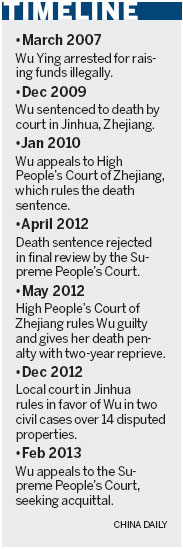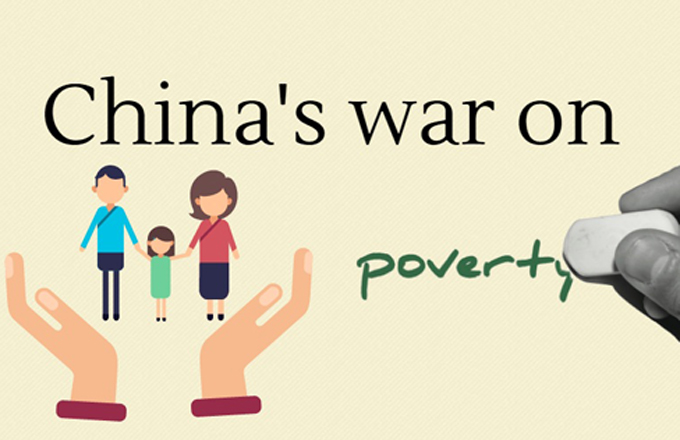Former tycoon seeks acquittal from top court
Wu Ying, a former tycoon sentenced to death with a two-year reprieve after being convicted of illegally raising money, has appealed to China's top court for an acquittal.
News of the appeal came from Lu Haibo, Wu's attorney, on Friday.
Wu, 32, the owner of Zhejiang-based Bense Holding Group, and once one of China's richest women, was found guilty of illegally raising 770 million yuan ($123 million) from 11 investors from 2003 to 2005 and cheating them out of 380 million yuan by offering high returns, while she spent the money on a lavish lifestyle, according to the verdict given by the High People's Court of Zhejiang when it found Wu guilty in May 2012.
 |
The Supreme People's Court rejected Wu's death penalty in a review of the case in April 2012, and a month later the High People's Court of Zhejiang gave Wu the death penalty with a two-year reprieve. But Wu and her father disagreed with the court ruling.
According to her lawyer, Wu appealed to the Supreme People's Court on Wednesday for withdrawal of the verdict and for a ruling that she is not guilty.
An official with the Supreme People's Court said on Friday he had not been informed about the arrival of Wu's appeal material and could not comment on the case, saying only that the court would respond to the appeal in accordance with the law.
According to a copy of the appeal China Daily acquired on Friday, Wu argues that she had no intention to cheat or defraud, and that she had not spent creditors' money on a lavish lifestyle.
The appeal states that her own money and Bense Group's assets were sufficient to pay off debts by the time Wu was accused.
In March 2007, Wu was arrested on suspicion of illegal fundraising and fraud, with seizure of her assets, valued at 171.64 million yuan.
Wu's appeal states that her assets and properties were significantly undervalued by the public security department, and if the real value of all her assets had been calculated properly, it would show she was capable of paying off her debts, and should not have been accused of cheating and fraud.
"A large amount of the appellant's assets were omitted on purpose. … The assets were valued at 171.64 million yuan, which was significantly lower than the actual value and was not objective," Wu's appeal states.
In November 2012, a local court in Jinhua ruled in favor of Wu in two civil cases involving 14 disputed properties. The properties cost Wu about 100 million yuan but were sold to defendants for some 4 million yuan through "fabricated contracts", according to Wu's father, Wu Yongzheng.
"What my daughter did was not raising money illegally, or fraud. It was not even illegal pooling of public deposits. There were disputes over debts, which should be considered as civil disputes instead of crimes," said Wu Yongzheng.
Wu Ying's appeal states she had no intention to cheat creditors as she had returned most of the money she borrowed from many creditors.
Buying jewelry was an investment, and the value of the jewelry has appreciated, according to the appeal document.
All the creditors were Wu's friends or family instead of the "public" as the verdict stated, her appeal says.
According to a judicial interpretation by China's top court, borrowing money from family and friends or a specific group of co-workers shall not be considered as illegal pooling of public deposits.
Zhao Yinan contributed to this story.



















